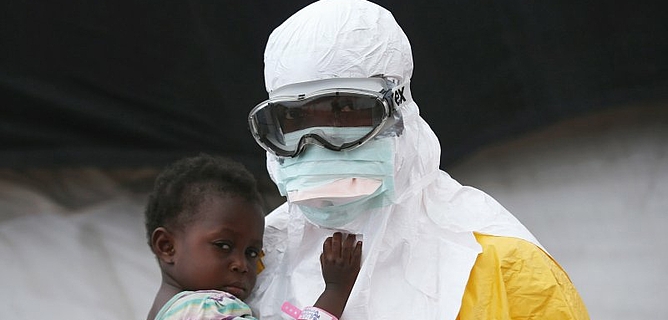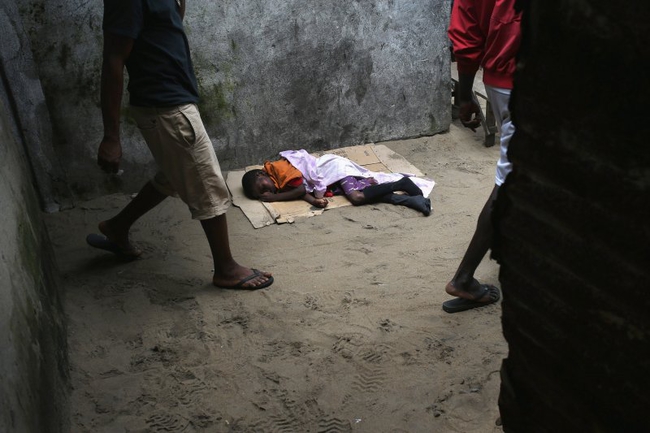Liberia : les orphelins d'Ebola
Autres, # |
|||
|
Ebola has killed more than 4,000 people in West Africa-and orphaned thousands more. In Liberia, where an average household is three kids, this problem is particularly pronounced. According to international nonprofit Save the Children, the country has registered more than 2,000 new orphans since the epidemic began. Unable to make it to a hospital, or too afraid, parents are dying at home alongside kids who are powerless to save them. If the children survive, they are left facing communities too concerned to take them in, scared they will spread the virus.
This problem, one of many plaguing the region due to Ebola, gets exponentially worse with every new victim. Children are losing parents to Ebola at a rate equal to that at which people in that region are dying. Carolyn Miles, the Executive Director of Save the Children, has just returned from a trip to Liberia when we speak via telephone. "This is having a huge impact on children" she says. A 16-year veteran of the organization, Miles confesses she's never seen anything like the impact of this epidemic. The impact on children, she says, is manifesting in three ways: kids contracting the disease, being orphaned by it, or losing their already limited options for education. Of the more than 8,000 people currently infected with Ebola in West Africa, an estimated 20 percent of them are under the age of 18. Without solid health or proper nutrition, the chances of recovery in this demographic are even lower than for the epidemic at large. "Three out of four of children infected with Ebola in West Africa are dying-that's a 75 percent mortality rate," says Miles. "These kids are already malnourished, they're not in the best of health. They're just not able to survive this." Based on her own experience, she estimates the number of orphans is already well above 4,000. Those that do survive, or are lucky enough to have escaped infection, meet a shadowy future. In Monrovia and other surrounding counties, Miles met with four sets of newly orphaned kids. The first group Miles encountered was four sisters, aged 18, 7, 6, and 3. With a father lost to the country's bitter civil war, the girls' mother had been left to care for them alone. Shortly after she succumbed to an Ebola infection in their home, burial squads arrived. "They took the body away and burned everything in the house, all of their possessions," says Miles.
Ostracized by the community, the girls had been given a small section of an outdoor porch to survive on. Without a source of income or supply of food, they had begun selling green leaves that are used for multiple purposes in Liberia for food. "The community was still very much not willing to engage with them at all," Miles says of the story. "They were certainly shunned." Later Miles met with a 19-year-old brother and his 7-year-old sister who had been living underneath a house since both their parents perished from Ebola. "They had virtually nothing," says Miles. "Basically people were throwing them food on occasion, but they really have very, very little support." Working with the Liberian government's department of social welfare, Save the Children is attempting to connect these orphans with relatives or other family members-and to find people willing to take care of them in the interim. Those lucky enough to have an older sibling who can give information about the whereabouts of non-immediate family have a shot at this. Young kids, who have trouble remembering even their own names, do not. "Younger kids just don't know the answer to all of those questions," says Miles. "Every time you ask, the story is slightly different." One such child, a 10-year-old in Liberia, had contracted Ebola at the same time as both his parents. Neither survived. Lying in the hospital recovery room at JFK in Monrovia, he was unable to give any details about where, exactly, they could find any other family members. A nearby family, also survivors of Ebola, has temporarily taken him in. It's not a story that's often repeated. On top of threatening their own physical safety and that of their parents, the Ebola epidemic is beginning to steal West African children's hope for a better life. According to Save the Children, more than 1 million school-going children living in the Ebola-affected areas of Liberia are currently out of school, with no immediate prospect of reopening. "We may not think of that as a big priority," says Miles, "but that's going to become very important." As the epidemic rages on, the children will continue to bear a huge brunt of the blow. While Miles says the kids she met were "incredibly brave," both their psychological and physical pain was evident. "They're traumatized...you could see it in their eyes," says Miles. While America's attention is fixated on the pair of confirmed Ebola cases in Dallas-and the dozens of Ebola scares across the country-the real tragedy continues to be in Liberia, Sierra Leone, and Guinea. The epidemic has already stolen many things from these countries, and as it continues to worsen, any semblance of stability that once remained for those growing up in that region will be one of them.
| |||
| PARTAGEZ UN LIEN OU ECRIVEZ UN ARTICLE | |||

Partagé par : Aliyaa@USA
SES STATS
Publications
J'aime Facebook sur ses publications
Commentaires sur ses publications
Devenez publicateur
Dernières Actualités
Pas d'article dans la liste.














